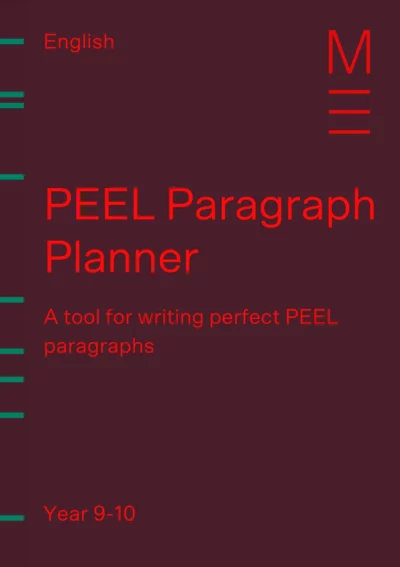Welcome to Matrix Education
To ensure we are showing you the most relevant content, please select your location below.
Select a year to see courses
Learn online or on-campus during the term or school holidays
Learn online or on-campus during the term or school holidays
Learn online or on-campus during the term or school holidays
Learn online or on-campus during the term or school holidays
Learn online or on-campus during the term or school holidays
Learn online or on-campus during the term or school holidays
Learn online or on-campus during the term or school holidays
Get HSC exam ready in just a week
Select a year to see available courses
Science guides to help you get ahead
Science guides to help you get ahead
Writing paragraphs is just like constructing buildings from blocks. You put together different elements to create a paragraph! So, let's find out what these 5 important elements are!

Join 75,893 students who already have a head start.
"*" indicates required fields
Related courses
Want to write exceptional paragraphs but not sure how? Well, you came to the right place! We will show you the 5 elements you need to learn how to write paragraphs!
Here are the 5 elements you must keep in mind when you are learning how to write paragraphs. You will find that many of these elements overlap one another!

Learn to write detailed and insightful paragraphs and score better marks!

Fill out your details below to get this resource emailed to you.
"*" indicates required fields
Writing a paragraph is like writing a mini-essay.
The topic sentence is your thesis, your analysis is your body and your linking sentence is the conclusion.
An essay without a thesis is simply an (often incoherent) information dump.
There is no focus and clarity: you aren’t demonstrating your ability to evaluate the text and answer the question.
This is the same with paragraphs without purposes. So, let’s see how we can give our paragraphs a purpose!
Body paragraphs need to directly support your thesis to make your essays more convincing.
Too often, students begin to waffle as they write. This is because the content of their writing isn’t directly supporting their thesis. What happens? They lose track of their thesis.
So, how can we support our thesis in our writing?
Your arguments should never be a generalisation or a broad statement.
If you are simply restating your thesis, then you are demonstrating that you don’t have a strong understanding of your text.
So, how do you ensure that your argument is specific enough?

With Matrix+ Online English Course, you will gain access to video theory lessons, Q&A boards to get feedback from expert teachers and get access to our extensive English resources. Learn more about Matrix+ Online Course now.
Get ahead with Matrix+ Online
Expert teachers, detailed feedback and one-to-one help. Learn at your own pace, wherever you are.
Teachers always go on about the importance of sustaining an argument. But, do you really know what that means?
A sustained argument is a main argument (your thesis) that is consistently carried throughout your essay
This means that everything you write has to somehow relate back to your thesis, including your paragraph ideas, topic sentences, and conclusion, right down to your evidence and analysis.
So, let’s see how we can write a sustained argument:
You need to write an essay that answers the question you received, not the question you want.
This means that you have to ensure that your thesis, paragraph ideas, evidence and analysis are always relevant to the question.
So, you must:
This will help you sustain your argument throughout your paragraph. All your writing is working towards a singular idea!
We know it’s tempting to show-off your analysis skills by analysing your most sophisticated piece of evidence instead of a less engaging but relevant example.
However, this will only cause you to lose marks because you are not answering the question.
So, how do you select relevant evidence:

Think of a signpost. They are signs that show the direction towards a town and how far away it is. They give travellers an indication of where they are headed or need to go.
Similarly, signposts in essay writing show your readers what to expect in your essay.
These are an essential way to continually remind your readers about your thesis and the purpose of the essay.
So, how do you signpost in your essay?
Your topic sentences are the main signposts of your essay. They are the first line of each paragraph that labels what each paragraph is about.
Readers look at topic sentences to get a feel of your paragraph
That’s why it is important that your paragraphs directly support your thesis. Your topic sentence will indicate whether or not your thesis is sustained throughout your essay.
So, how do we write a topic sentence?
You can also signpost by using keywords from your thesis or question throughout your essay.
This is an explicit way to show your readers that you are answering the question.
Using keywords as a signpost for your thesis/question also helps you sustain your argument. It stops you from straying away from your essay’s purpose.
So, how do you do this?
Note: It is better if you use the exact words and phrasing from the question. However, if you feel like it is getting repetitive, feel free to use some synonyms too.
Students tend to overlook the importance of ordering their ideas in a specific manner.
However, structuring your writing helps your reader easily follow your argument.
When you are planning your essays, you should think about ordering your paragraph ideas, and your evidence and analysis.
There are many different ways you can do this. Remember, you don’t have to stick to one method. Feel free to mix and match to suit the purpose of your essay.
Let’s see what the different structures are:
Logical progression refers to how each idea/analysis smoothly leads you to the next one.
You should use this method if your readers need to understand the 1st point to be capable of understanding the next.
For example, you need to understand the plot of Romeo and Juliet before you are able to understand its themes and messages.
This is an effective way to show how ideas/analysis are connected to one another. Students can also use logical progression to slowly lead the reader to a conclusion.
So, how do we structure our writing using logical progression?
These essays order their ideas/evidence from the most important/strongest to least important/weakest.
This method is useful if your ideas/evidence aren’t linked by cause and effect or if you want to persuade your reader.
By showing the most important argument/evidence first, you immediately capture the reader’s attention. This will keep them reading through your other points.
So, how do I use this structure in my essays:
Coherence refers to the clarity and unity of your writing.
Think about coherence as the bridge linking your sentences, ideas and paragraphs.
A coherent essay means that all parts of your writing work well together to ensure that your readers are able to follow the flow of your writing and ideas.
So, how do we ensure that our writing is coherent?
Connective (or transition) words are extremely useful when drawing connections between different points.
You can use them to lead your reader to the next sentence or paragraph.
Let’s see the different types of connective words you can use in your writing:
| Addition/Similarity | Differences | Example |
|
|
|
| Emphasis | Cause and Effect | Sequence/Order |
|
|
|
b. Repeating words
Similar to signposting, repeating words show your readers that you are linking to previously discussed points.
For example,
“William Golding explores themes of civilization and anarchy in Lord of the Flies. Here he uses the conch shell to symbolise civilisation as it ensures order during the boy’s meetings; whoever holds the shell is allowed to speak during the meeting without interruption. As such, when the conch shell was broken, Golding highlights how the boys have fallen into anarchy“
Notice how the repeated words unify this short paragraph? It explicitly shows us that every sentence and analysis is connected to one another in different ways.
So, don’t shy away from repeating the same words!
As we’ve consistently stated throughout this article, your writing should always be unified by your thesis (your purpose).
Even if you don’t pay attention to repeating words or connective words, your essays will be coherent as long as your ideas, topic sentences, evidence and analysis consistently support your thesis.
Written by Matrix English Team
The Matrix English Team are tutors and teachers with a passion for English and a dedication to seeing Matrix Students achieving their academic goals.© Matrix Education and www.matrix.edu.au, 2023. Unauthorised use and/or duplication of this material without express and written permission from this site’s author and/or owner is strictly prohibited. Excerpts and links may be used, provided that full and clear credit is given to Matrix Education and www.matrix.edu.au with appropriate and specific direction to the original content.